|
|
|
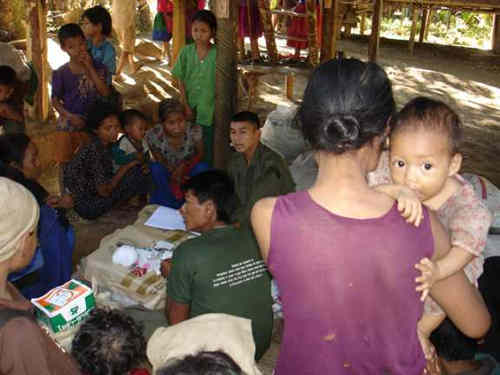
New Kachin team medic and Karen medic treating IDPs from Mon township and Toungoo district, 21 November 2006. These are some of the 350 newly fleeing people the teams met yesterday. Northern Karen State.
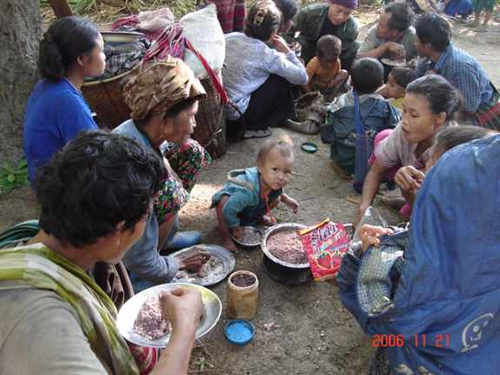
People eat, Karenni medic at back. 21 November 2006, Northern Karen State.
Dear friends.
Thank you for all of you who work in many ways for the people of Burma. In the face of the ongoing offensive by the Burma Army in the Northern Karen State and their oppression of all of the people of Burma, there is much bad news. Yet there are good things happening as the people of Burma find ways to make a positive difference. Different groups are working together to bring help to the displaced people and there are many people all over the world who help in diverse ways. Some of the good things that are happening are the presence in the field of dedicated men and women from many organizations who bring help to the people under attack. Here in the Northern Karen State, we have just completed the training of new relief teams. This training of new teams was done in response to the needs of over 25,000 newly displaced people and the need to help the full time FBR teams already in the field. These new teams are now providing medical care and relief to the people fleeing the attacks. Just this morning we met 350 more Karen as they fled – the new teams treated over 150 of them for sickness, exhaustion and malnutrition. They all had stories of burned homes and the killing of villagers. One 16-year-old boy was carried in missing a leg- victim of a Burma Army landmine. He was smiling when he saw us. They are a most resilient and giving people. The old teams have been with the displaced people throughout the offensive providing medical care, and basic humanitarian assistance- clothes, plastic tarps, blankets, cooking pots and limited amounts of food assistance. We are grateful for the help we have received form many local organizations and for the unity of effort here.
More Pictures of the 350 fleeing Karen are included at the bottom of this report.
Thank you,
FBR
|
October to November 2006
A combined leadership and humanitarian relief team training took place in the Karen State of Burma from October to November 2006. The training integrated the issues of ethnic unity, leadership, capacity building, humanitarian relief, medical assistance, reporting and advocacy.
9 multi-ethnic teams- Karen, Karenni, and Kachin attended. One of the purposes of the leadership training was to further understanding and unity among young ethnic leaders, to raise issues of concern and to develop leadership among the participants. A practical aspect of the training focused on training ethnic teams to bring help, hope and love to the people of Burma, especially to the Internally Displaced Persons (IDPs). Over 100 men and women comprising 4-5 person teams as well as teams of ethnic Karen, Karenii, and Shan instructors, participated in the training and now are going on relief missions. The training was organized in cooperation with the National Democratic Front (NDF), hosted by the Karen National Union (KNU) and facilitated by the Free Burma Rangers (FBR).
The teams received training in ethnic issues, leadership, ethics, conflict resolution, public health, first aid, advanced medical and basic dental care, human rights interviewing and documentation, reporting, counseling, video and still camera, map and compass, land navigation, sketching, mule packing, swimming, lifesaving, rappelling, rope bridge building, river crossing techniques, security, solar power and battery management, communications, planning, operation orders, history of ethnic nationalities of Burma, physical training and a field training exercise. A woman’s workshop after the training with the Karen Women’s Organization (KWO) produced useful tools for teams to teach nutrition, sanitation, food preparation and personal hygiene while in IDP sites and villagers. Instructors from the Karen Human Rights Group (KHRG), Committee for Internally Displaced Karen People (CIDKP) and Karen Office of Relief and Development (KORD), also gave expert instruction to the teams on the topics of human rights documentation, relief, and reporting.
The training culminated in a two-day field training exercise to test the teams in every area of their training. This exercise was conducted using an IDP scenario with fifteen stations to which the students had to navigate and complete the assigned tasks. This was conducted under pressure, over difficult terrain with multiple river crossings and no food or sleep. Every team successfully completed all tasks.
Upon graduation each team was equipped with enough medicine and medical supplies to treat 2,000 IDPs, a video camera, tapes, still camera, film, radio, flashlights, backpacks, hammocks, personal equipment, cash for travel, food for emergency relief, educational supplies (including bibles and hymnals where requested-some areas are Christian, some Buddhist, some Animist- this is up to the teams and people of each area), “Good Life Club” packs for children, clothing for IDPs, toys, sporting equipment and a reporting format. Each team is now conducting relief missions to IDPs. Upon completion of their missions (1-3 months), each team will send a completed report and all tapes and film to their respective leaders who will in turn send them to the FBR office. Any relevant relief, human rights, medical or other information will be passed on to the appropriate organizations. The teams will be evaluated, retrained in needed areas, re-supplied and then sent on to the next relief mission.
|
These pictures were taken on 21 November as 350 more people fled attacks by the Burma Army. These families have been in hiding since February 2006 and have suffered the loss of loved ones, homes and their land. They like over 25,000 other people here in Northern Karen State, have been displaced and are on the run. They are now trying to get to the Thai border. The medics treated over 150 people today as many are sick and malnourished. The children are especially weak and in need of food and rest.
Thank you and God bless you, The Free Burma Rangers
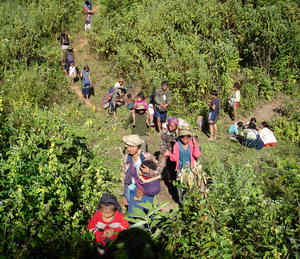
Families flee Burma Army, 21 November 2006
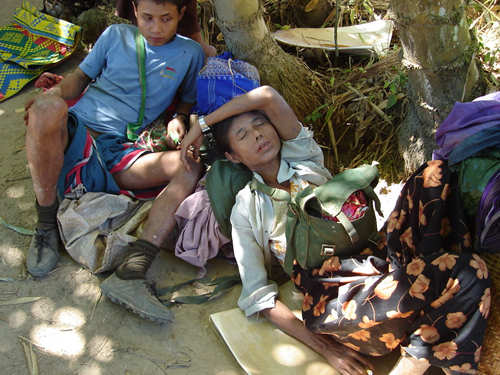
Woman collapses while fleeing Burma Army
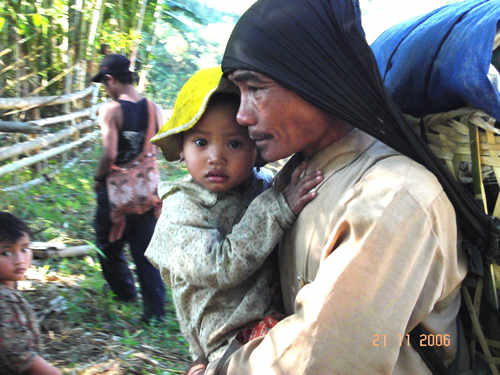
Father and child in Northern Karen State
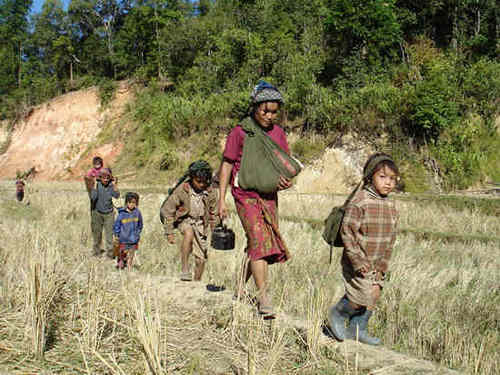
Family flees Burma Army attacks
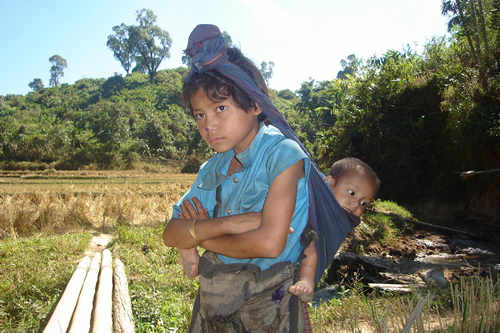
Girl carries small child
ENDS
